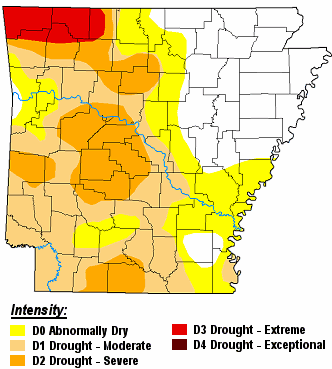Arkansas' net farm income is expected to see a $1.06 billion drop from its 2022 record-high levels. The report also compares the projected 10 percent reduction in state net farm income to the projected 6.2 percent decline in the U.S. net farm income projected by Mizzou’s Food and Agricultural Policy Research Institute.
“Fertilizer and pesticides and fuel oils are going to decline by 9 percent year over year,” said Ryan Loy, extension economist for the Division of Agriculture. “These markets are finally stabilizing. They're coming off these market shocks from COVID, the supply chain issues, the trucker strikes in Canada, and the Ukraine war is kind of baked into the market now.”
The report said total production expenses are estimated to decline 5 percent in 2024, as fertilizer, feed and fuel expenses retreat. An additional 5 percent decrease in production expenses is forecasted for 2025.
Unfortunately, “the decrease in fertilizer, pesticides, fuel oils, and feed expenses are offset by the increase in purchased livestock expenses, which amount to a rise of $1.34 billion in 2025,” Loy said.
Cash receipts
Farm cash receipts represent the total revenue a farm receives from the sale of its agricultural products, government program payments, and private insurance payments.
The report said that in 2024, total cash receipts for Arkansas would decline by 2 percent or $317 million. Livestock receipts increased 5 percent, or $361 million, while crop receipts tumbled 10 percent, or $580 million.
Ironically, 2024’s near-record yields are contributing to lower commodity prices.
Hunter Biram, extension economist for the Division of Agriculture, said that Arkansas had
Nearly a million and a half acres of rice which is the highest since 2020. Yield is near the record set in 2021 at 7,600 pounds per acre.
“The price is the lowest that we've seen since 2021 when it came in right under $14 a hundredweight,” he said.
Corn, which has had the fewest number of Arkansas acres since 2015, is forecast to have a near-record high yield. However, “the price for corn is the lowest that we’ve seen in five years.”
Cotton was in the same boat.
“The acreage is the highest that we've had since 2011,” Biram said. “We've got a lot of cotton acres out there, despite having the lowest price since 2020 and it’s at a near-record yield.”
Arkansas’s 3 million acres of soybeans are projected to have a record yield of 55 bushels an acre, Biram said. “The price for soybeans is the lowest that we've seen since 2019, which is similar to corn.”
Livestock and poultry
However, the low prices that bedevil row crop growers is helping the cattle and poultry industry, which relies on crushed soybean and corn for feed.
Higher egg, broiler, and cattle prices support 5 percent higher total livestock receipts in 2024, the report said, adding that poultry receipts are projected to increase by $287 million, while cattle and hog receipts are also projected higher, by $97 million.
Loy noted that “feed prices declining this year pretty significantly – 18 percent.
“Cattle prices are up 6 percent year over year. Most of the uptick over the last few years is due to the severe drought in the western U.S., which led ranchers to reduce herds,” he said. However, with cheaper feed, cattle prices are “expected to decline again in 2025.”
Government assistance
The report also shows the proportion of government assistance has shifted from primarily market-based programs such as Agricultural Risk Coverage and Price Loss Coverage — known as ARC and PLC, to supplemental and ad hoc disaster assistance across this same period.
The Fall 2024 Farm Income Outlook is co-published by the University of Arkansas System Division of Agriculture and RaFF at the University of Missouri, which provides objective policy analysis and informs decision makers on issues affecting farm and rural finances. The center collaborates with a number of states to develop farm income projections with local expertise.
“RaFF’s Farm Income Outlook for calendar years 2024 and 2025 is intended to inform policymakers, industry analysts, and agricultural practitioners about the expected profitability of the local agricultural sector and its main drivers. RaFF’s state-level projections complement and add granularity to national projections by the USDA and FAPRI-MU, providing valuable insights on local agricultural trends,” said RaFF Director Alejandro Plastina.
The full report and data tables are online.
To learn about extension programs in Arkansas, contact your local Cooperative Extension Service agent or visit www.uaex.uada.edu. Follow us on X and Instagram at @AR_Extension. To learn more about Division of Agriculture research, visit the Arkansas Agricultural Experiment Station website: https://aaes.uada.edu. Follow on X at @ArkAgResearch. To learn more about the Division of Agriculture, visit https://uada.edu/. Follow us on X at @AgInArk.
























